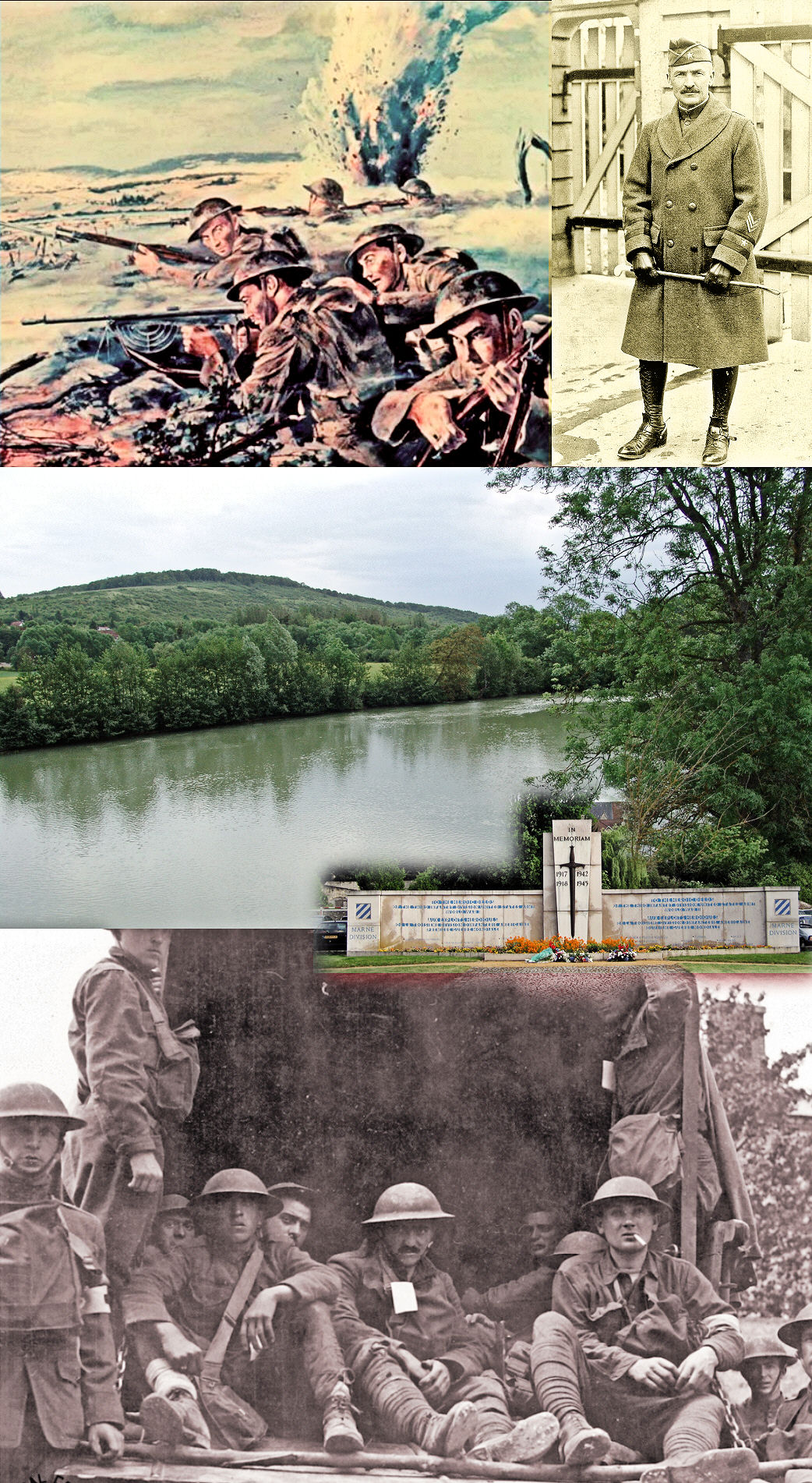Ninety-five years ago today the German Army launched the fifth of the their "Ludendorff Offensives" on the front between Chateau-Thierry and Reims. Along the western half of the sector this meant mounting an assault across the Marne River. The key crossing point was five miles east of Chateau-Thierry around the village of Mezy. Just behind Mezy was the opening to a valley which—if entered—would allow the attackers to penetrate the Allies' rear deeply. Defending on either side of Mezy were two regiments of the American Third Division. Their action here on 15 July 1918 helped halt the last German offensive of World War I.
This is how an American Official History records the event:
This is how an American Official History records the event:
On July 15, 1918, the 38th Infantry of the 3d Infantry Division successfully defended its position on the Paris-Metz railroad, 200 yards from the River Marne, against six German attacks. It was the last great offensive of the German Army and the first fight of the 38th Infantry in World War I. Initially, the Germans succeeded in driving a wedge 4,000 yards deep into the 38th Infantry’s front while the U.S. 30th Infantry on its left and the French 125th Division on its right withdrew under heavy pressure. With the situation desperate, the regiment stood and fought. The two flanks of the 38th Infantry moved toward the river, squeezing the German spearhead between them and exposing it to heavy shelling by the 3d Division artillery. The German Army’s offensive failed. With this brave stand the 38th Infantry earned its nom de guerre Rock of the Marne. General John J. Pershing declared its stand “one of the most brilliant pages in our military annals.”
Click on Image to Expand
From Top: U.S. Army Official Painting of the Battle, Colonel Ulysses Grant McAlexander, Commander 38th Infantry, the German Crossing Site on the Marne today, 3rd Division Memorial at Chateau-Thierry, Wounded Men of 30th & 38th Infantry on 15 July 1918
This is how two German soldiers later recalled that day:
... All [German] divisions [along the Marne] achieved brilliant successes, with the exception of the one division on our right wing. This encountered American units! Here only did the Seventh Army, in the course of the first day of the offensive, confront serious difficulties. It met with the unexpectedly stubborn and active resistance of fresh American troops.While the rest of the divisions of the Seventh Army succeeded in gaining ground and gaining tremendous booty, it proved impossible for us to move the right apex of our line, to the south of the Marne, into a position advantageous for the development of the ensuing fight. The check we thus received was one result of the stupendous fighting between our 10th Division of infantry and American troops ...Erich von Ludendorff, Quartermaster GeneralI have never seen so many dead. I have never seen such a frightful spectacle of war. On the other bank the Americans, in close combat, had destroyed two of our companies. Lying down in the wheat, they had allowed our troops to approach and then annihilated them at a range of 30 to 50 yards. "The Americans kill everyone," was the cry of fear on July 15—a cry that caused our men to tremble for a long time.Lt. Kurt Hesse, Adjutant, German 5th Grenadiers


God bless those brave men of the 3rd "Marne" Division!
ReplyDeleteThe brave go forward. 2-38th and 1-30th are still active duty units.
ReplyDeleteMy Grandfather was there.
ReplyDeleteMy great-uncle, Emil Hermann Bangert of Todd County, Minnesota, was there, too.
DeleteThis comment has been removed by the author.
ReplyDeletefbJKC
ReplyDeleteMy grandfather, Maj. Sidney H. Young, won the Silver Star at this battle.
ReplyDeleteHe didn't "win" the medal. .. there are no competition for a medal. He "earned" it ... thank you for his service.
DeleteWarfare is a fascinating subject. Despite the dubious morality of using violence to achieve personal or political aims. It remains that conflict has been used to do just that throughout recorded history.
ReplyDeleteYour article is very well done, a good read.
I served in the 2nd Bn, 10th Field Artillery from 1981-1985 at Ft. Benning, Georgia. Our motto: “The Rock’s Support.” Elements of the 10th Artillery were assigned to the 3rd Division Artillery at this battle; the fire support provided there is the origin of the regiment’s motto.
ReplyDeleteReally enjoyed reading this. I am currently typing up my grandfather's World War I journal (George Politis, Private, U.S. Army Rainbow Division) before its ink fades entirely, and he refers to Mezy in it. I am trying to provide modern-day equivalents to the place names in my grandfather's journal. Can you confirm for me that the Mezy of 1918 refers to the modern-day Mézy-Moulins in the Aisne department of France? Thank you.
ReplyDeleteYes, I believe that's the case.
Delete